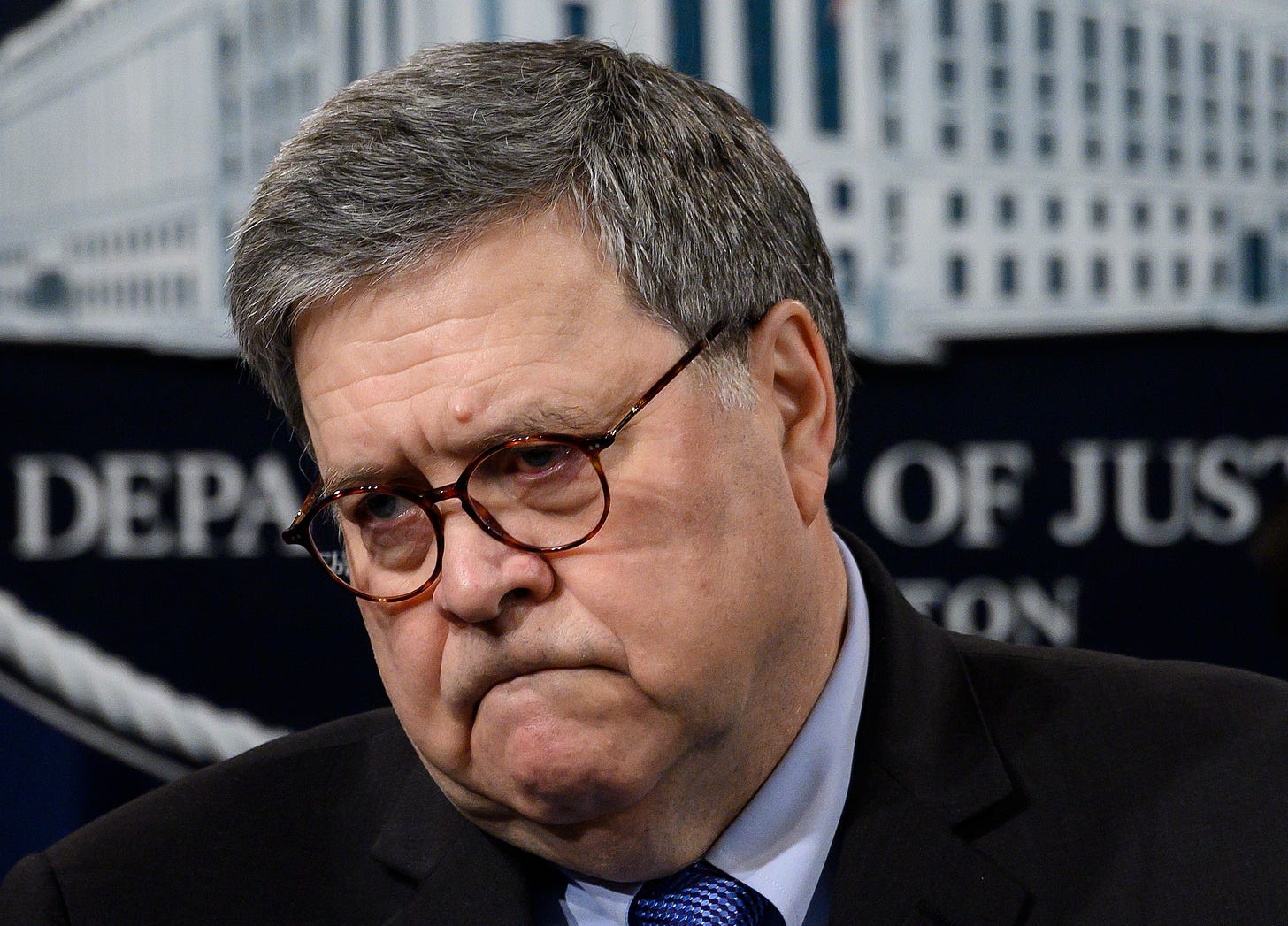Bill Barr’s Really Bad First Year
The attorney general has turned his office into that of a wartime consigliere for the president.

What should we make of Attorney General William Barr’s decision to nip at President Trump on Thursday? In an interview with ABC News, Barr called on the president to “stop the tweeting about Department of Justice criminal cases,” and said that Trump’s tweets “make it impossible for me to do my job”:
I’m not going to be bullied or influenced by anybody . . . whether it’s Congress, a newspaper editorial board, or the president. I’m going to do what I think is right. And you know . . . I cannot do my job here at the department with a constant background commentary that undercuts me.
It’s a sad statement about our times that the attorney general finds himself publicly griping about his boss’s social-media habits. You almost want to hope that the interview was just for show—a ploy coordinated with the White House to give Barr some political cover. Because if it wasn’t, that means the nation’s top law enforcement officer decided the best way he could communicate with the president on an important matter was through a TV interview.
It was one year ago today that Barr became attorney general. (I know; it feels like it’s been much longer.) Over the past year, he has turned his office into that of a wartime consigliere for the president.
He shielded the president from the Mueller report by misrepresenting its findings and delaying its release.
He contradicted his own department’s inspector general to keep alive the Trumpworld conspiracy theory that a deep-state liberal cabal was behind the 2016 FBI investigation into the Trump campaign.
He was allegedly involved in the Ukraine scandal, though exactly how is still murky thanks to the Senate Republicans who decided that witnesses weren’t relevant to the president’s impeachment trial.
He recently admitted he has established a back-door channel through which Rudy Giuliani—who happens to be under federal criminal investigation—can transmit information intended to smear the president’s political rivals.
Most recently, he personally intervened in Roger Stone’s sentencing, spiking the career prosecutors’ original recommendation in favor of a much more lenient one. All of the career prosecutors involved in the case withdrew from it in protest.
Barr also announced this week that senior Justice Department leadership—could that mean him, by any chance?—will personally review any investigations into 2020 candidates. He’ll be a totally neutral and fair arbiter, right?
Many journalists trying to understand Barr have suggested that his actions can best be understood as informed by, and in defense of, the “unitary executive theory” of presidential power. This theory, which is common among conservatives, simply holds that the Constitution means what it says: “The executive Power shall be vested in a President of the United States of America.” As Justice Scalia argued in a famous 1988 dissent, any power outside the constitutionally ordained branches of government would be unencumbered by checks and balances, and therefore prone to becoming tyrannical. The unitary executive theory as Scalia framed it is not about an expansive and powerful executive, as is often claimed, but about accountability and oversight.
The unitary executive theory is especially tricky when it comes to matters of justice. On the one hand, it suggests that government investigators and prosecutors cannot stand apart from the three branches of government. (The Scalia dissent quoted above was in a case about the independent counsel statute.) On the other hand, if we think of federal investigators simply as part of the executive branch—because, under the unitary executive theory, what powers they have necessarily flow from the president—that leaves enormous room for corruption and political interference in legal matters.
Supposedly in accordance with the unitary executive theory, Barr has intervened in law enforcement matters in ways that benefit the president’s political interests, starting with his handling of the Mueller report, and including his globe-trotting mission to dig up “evidence” that the FBI investigation into the 2016 Trump campaign was triggered not by contacts between campaign officials and the Russian government (or its tentacles) but by Western intelligence.
But in Barr’s case, the theory isn’t to blame. The insulation of law enforcement from politics isn’t enshrined in law so much as it is a norm that previous presidents and attorneys general maintained—a norm that ultimately depends on enforcement by Congress and the public. Any previous president who so blatantly used law enforcement as a political tool would have feared impeachment, or at least public outcry.
The fundamental problem with Barr—as with the president and every other character in this administration eating away at the American republic like plaque on a tooth—is that he is using his power for corrupt ends, and the people responsible for preventing corruption are too venal, small-souled, or spaghetti-spined to do their jobs.
Don’t blame the unitary executive theory for Barr’s perfidy. Blame Barr.


